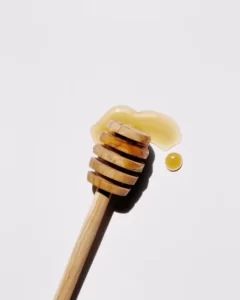Table of Contents
Introduction
When it comes to sweetening your foods and beverages, you may be wondering whether honey or sugar is the better choice for your health. While both honey and sugar can add sweetness to your meals, they have their differences in terms of nutritional content and impact on your body. In this article, we will compare honey and sugar to determine which one is healthier for you.
What is Honey?
Honey is a sweet substance produced by honeybees and has been used as food and medicine for thousands of years. It is made when honeybees collect flower nectar and process it using a special enzyme in their digestive systems. The nectar is then placed in honeycombs, where worker bees flap their wings to create a warm breeze that dries and cures it, turning it into honey. The bees cap and store the honey in the honeycomb once it has reached the right consistency. Finally, beekeepers harvest and package the honey, making it available for consumption.
Nutritional Content of Honey
Honey is a carbohydrate that contains various substances, including sugars, water, proteins, vitamins, minerals, enzymes, and antioxidants. The sugars in honey, including fructose, glucose, maltose, trisaccharides, and sucrose, make up about 82.5% of its composition. Water makes up around 17% of honey, which is relatively low compared to other foods. Additionally, honey contains essential minerals like potassium, calcium, copper, iron, magnesium, manganese, phosphorus, sodium, zinc, and selenium. It also contains vitamins such as ascorbic acid (vitamin C), thiamine (vitamin B1), riboflavin (vitamin B2), niacin (vitamin B3), pantothenic acid (vitamin B5), and pyridoxine (vitamin B6). Honey is also rich in antioxidants and flavonoids, although in trace amounts.
Types of Honey
There are several types of honey available, including regular honey, raw honey, and Manuka honey.
-
Regular honey: This is the most common type of honey found in grocery stores. It is often pasteurized to preserve its color and texture and prevent crystallization. However, the pasteurization process removes some of the beneficial nutrients found in raw honey.
-
Raw honey: Raw honey is unprocessed and is offered in its natural form, straight from the beehive. It retains all the beneficial nutrients found in honey, but it may crystallize more quickly and require special storage considerations.
-
Manuka honey: Manuka honey is a special type of raw honey that comes from New Zealand. It is made by bees that forage flowers from the Manuka tea tree. Manuka honey contains unique beneficial nutrients, including leptosperin and methylglyoxal (MGO), an organic antibacterial compound derived from the nectar of the Manuka tea tree.
What is Sugar?
Sugar is a commonly used sweetener that is extracted from sugar cane stalks or sugar beets. The sugar juice is boiled until it crystallizes, and the crystals are separated from the liquid. The sugar is then refined to its final form, whether granulated, powdered, or brown.
Nutritional Content of Sugar
Sugar, also known as sucrose, is made up of 50% fructose and 50% glucose. It does not contain any additional nutrients beyond these simple sugars.
Types of Sugar
There are different types of sugar available, each with its own characteristics:
-
Raw sugar: Raw sugar is sugar in its raw form without being refined. It is often used in coffee shops and home baking.
-
Granulated sugar: Granulated sugar, also known as table sugar, is the most common type of sugar found in households.
-
Cane sugar: Cane sugar is minimally processed sugar made primarily from sugar cane.
-
Powdered or confectioners sugar: Powdered sugar is a fine powder that is often used to make icings and frostings for baked goods.
-
Light brown sugar: Light brown sugar is granulated sugar with a small amount of molasses added.
-
Dark brown sugar: Dark brown sugar has a higher molasses content, which gives it a deeper flavor.
Health Comparison: Honey vs. Sugar
Now that we understand the basics of honey and sugar, let’s compare their health benefits and drawbacks.
Glycemic Index
The glycemic index (GI) rates foods based on how they affect blood sugar levels. Foods with a high GI can cause a rapid increase in blood glucose levels, while those with a low GI release glucose more slowly and steadily. Honey has a lower glycemic index compared to sugar, making it a better choice for those looking to maintain balanced blood sugar levels. The glycemic index of sugar is 65, while the glycemic index of honey is 61. It’s important to note that the glycemic index can vary slightly among different types of honey and sugar.
Nutritional Content
Honey contains beneficial nutrients like vitamins, minerals, enzymes, and antioxidants, which are not found in sugar. These nutrients contribute to the overall health benefits of honey. On the other hand, sugar does not provide any additional nutrients beyond fructose and glucose.
Sweetness and Calorie Content
Honey is sweeter than sugar, which means you can use less of it to achieve the same level of sweetness. Additionally, honey contains less sugar and calories per gram compared to table sugar. This is mainly due to its higher water content. However, when comparing a tablespoon of honey to a tablespoon of sugar, the calorie and sugar content of honey is higher. This is because honey is denser and weighs more than sugar.
Manuka Honey and Unique Benefits
Manuka honey, in particular, has unique health benefits due to its composition. It contains leptosperin and MGO, which are organic antibacterial compounds derived from the nectar of the Manuka tea tree. These compounds give Manuka honey additional antimicrobial properties and make it highly sought after for its potential health benefits.
Conclusion: Honey vs. Sugar – Which is Healthier?
In conclusion, honey, especially raw honey and Manuka honey, is generally considered a healthier choice compared to sugar. Honey has a lower glycemic index, contains beneficial nutrients like vitamins, minerals, and antioxidants, and offers a sweeter taste with fewer calories per gram. However, it’s important to consume honey in moderation as it still contains sugars. If you’re looking for a natural sweetener that provides additional health benefits, consider incorporating honey into your diet. Manuka honey, in particular, offers unique properties that make it a popular choice among health-conscious individuals. Remember to choose raw and unprocessed honey whenever possible to retain the maximum nutritional benefits.



